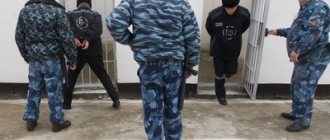Probation: what is it?
A suspended sentence can be given to an accused person who does not have to be isolated from society. He is not dangerous to others and he can atone for what he has done if he strictly follows all the rules of discipline and socialization during the term that was sentenced to him by the court. In the criminal legislation of the Russian Federation, conditional imprisonment can be defined in different ways:
- A period of special reprieve from sentencing.
- Methods of special education for a person who has violated the law, in order to direct him on the right path.
- Release of the person who committed the act from actual detention.
- A special type of punishment in relation to the person who committed the act, but its execution is not implied.
Following the Criminal Code of the Russian Federation, the implementation of a suspended sentence must be defined as punishment. This fact is supported by the fact that it was included in Chapter 10 “Imposition of punishment”, and not in Chapter 12 “Exemption from punishment”.
Timing and types
Several types of probation can be distinguished in accordance with the methods of punishment with which they are replaced. To put it simply, conditional punishment can be applied in the following forms:
- correctional work;
- restrictions on military service;
- restrictions on personal freedom;
- disciplinary action;
- conclusion for the fiscal term.
In most cases, a suspended sentence is established as a forced restriction of communication with society for a certain period of time, as stated in Article 73 of the Criminal Code of the Russian Federation. But it is not always possible to use the option of conditional punishment; for example, it is not used if the term for the crime committed exceeds 8 years due to the fact that it is the most serious.
Probation for murder. Truth or myth?
Murder, that is, intentionally causing the death of another person, is one of the most serious offenses in the Russian Criminal Code. Article 105 of the Criminal Code of the Russian Federation provides for very severe punishment, up to life imprisonment.
In our article today we will tell you whether it is realistic to receive a suspended sentence for murder, and we will also try to debunk some myths in this regard.
To answer the question posed, we will turn to the most authoritative source - the Criminal Code of Russia.
Article 73 of the Criminal Code of the Russian Federation states that a conditional sentence can be applied to those persons who are sentenced to imprisonment for a term of up to 8 years if the court comes to the conclusion that it is possible to correct the convicted person without actually serving the sentence. At the same time, the defendant must not have a dangerous or especially dangerous recidivism, and also not be on probation for a previous conviction.
Part 1 of Article 105 of the Criminal Code of the Russian Federation (murder without qualifying criteria) provides for a punishment of 6 to 15 years in prison.
Thus, we can come to the conclusion that there are formal grounds for a suspended sentence for murder. Theoretically, this could happen if the court orders under Part 1 of Art. 105 of the Criminal Code of the Russian Federation imprisonment for up to 8 years.
But theory is one thing, and practice is quite another, which indicates that a suspended sentence for murder is extremely rarely given, even if the main term does not exceed 8 years. The reason for this approach is very simple - murder is considered one of the most socially dangerous acts, and if the courts give a “condition” under this article, society simply will not understand them.
Situations where some chance of probation does arise include the following:
— Charge of attempted murder (part 3 of article 30 and part 1 of article 105 of the Criminal Code of the Russian Federation). In this case, the court may take into account certain circumstances, including the age of the defendant and his state of health. Despite the fact that courts almost always give a real sentence for attempted murder, suspended sentences under this article are found in judicial practice.
— The defendant has a serious incurable disease or injury that makes it impossible to serve his sentence in prison.
As for the possibility of a suspended sentence under Part 2 of Art. 105 of the Criminal Code of the Russian Federation, this is impossible, because, according to the sanction of this article, the minimum sentence is 8 years of imprisonment.
Now let’s talk about the myths and stereotypes that exist in society, which are often fueled by legally illiterate headlines in the tabloid press. We are talking about cases where courts impose fairly lenient punishment on citizens accused of committing crimes that resulted in death by negligence and some other situations. We are talking about such articles of the criminal code as 107 of the Criminal Code of the Russian Federation (murder in a state of passion), 108 of the Criminal Code of the Russian Federation (murder when exceeding the limits of necessary defense), 109 of the Criminal Code of the Russian Federation (causing death by negligence) and some others.
These crimes are fundamentally different from murder (Article 105 of the Criminal Code of the Russian Federation), since here the death of another person is caused either unintentionally or as a result of the use of inadequate methods of defense against attack. Accordingly, the sanctions of these articles are much softer than those of the article on ordinary murder.
Despite this, journalists quite often, without understanding the legal nuances, print headlines in their publications like “The killer received a suspended sentence,” thereby creating a misunderstanding of the situation among ordinary people.
Still have questions? Ask them to our lawyers:
When can a suspended sentence be applied?
A suspended sentence can be applied only in a few cases, and for this purpose personal qualities must be taken into account, in particular:
- The correct behavior of a person in the period that precedes and after the crime.
- The presence of people dependent on the defendant.
- If the culprit voluntarily repented of the offense he committed.
- If he did everything possible to help the authorities solve the crime and help find the culprit.
- If he is characterized positively at work or at his place of study.
- Poor health or the defendant has a predisposition to developing ailments affecting the lungs.
- Young or old age.
If the accused has one or more mitigating circumstances, the court may sentence him to a suspended prison sentence. A convicted person can count on this type of punishment if what he has done is not too serious, he has been convicted for the first time, he has repented and obeyed.
Although there is no such wording in the Criminal Code of the Russian Federation, and no one denies that even when committing a serious crime, the accused can receive a suspended sentence, but the justice authorities never make such decisions. A suspended sentence cannot be imposed in the following cases:
- If a person persuaded a minor to have sexual intercourse, and also introduced him to depraved acts, prostitution and pornography.
- For any actions related to terrorism.
- For acts with grave consequences committed while serving a sentence for an earlier crime in a suspended form or part of an actual sentence after parole.
- If a person has repeatedly committed a crime that poses a danger to others.
Only the court, taking into account all the facts, can establish a suspended or real sentence. If there is even the slightest doubt, the court can assign the accused a probationary period, which will make it clear whether the punishment was correctly imposed or whether he should still be taken into custody.
Introduction
A person serving detention in a disciplinary military unit, forced labor or imprisonment is subject to parole if the court recognizes that for his correction he does not need to fully serve the sentence imposed by the court, and has also compensated for the damage (in whole or in part), caused by a crime, in the amount determined by a court decision. In this case, the person may be fully or partially released from serving an additional type of punishment.
Part 1 of Article 79 of the Criminal Code of the Russian Federation
So, being on parole, or rather simply serving a suspended sentence, since Part 2 of Art. 79 of the Criminal Code of the Russian Federation establishes that:
When applying conditional early release, the court may impose on the convicted person the duties provided for in part five of Article 73 of this Code, which must be fulfilled by him during the remaining unserved part of the sentence.
Part 2 of Article 79 of the Criminal Code of the Russian Federation
What the courts actually do with respect to the unserved part of the sentence, turning it into a suspended sentence and, accordingly, creating for the released person the obligations provided for on conditionally convicted persons, provided for in Part 5 of Art. 73 - “do not change your permanent place of residence, work, study without notifying the specialized government body that monitors the behavior of the probationer, do not visit certain places, undergo treatment for alcoholism, drug addiction, substance abuse or venereal disease, work (get a job) or continue education in a general education organization. The court may impose on the conditionally convicted person the performance of other duties that contribute to his correction.”
What happens when a person commits a new crime while on parole? Next, we will consider not only the gravity of the crime, but also the administrative offense on parole.
Reasons for increasing the trial period
There may be several reasons for making such a decision:
- if the defendant tries with all his might to avoid fulfilling the obligations that were imposed by a suspended sentence;
- if the convicted person committed another crime, public order was violated, but the punishment was administrative;
- if the convicted person did not want to compensate the injured party in full or at least partially.
In all these cases, the inspector who monitors the execution of the suspended sentence may ask the court to extend the probationary period, but there is also a limitation here: it is allowed to extend it for no more than a year. This is done so that there is an opportunity to further observe the convicted person and after that make a final decision.
What restrictions are set?
Is a suspended sentence a prison sentence or not? This question is asked by many people who have little knowledge of the law. A suspended sentence is a type of punishment in which a person remains free, but has a number of social restrictions.
- In accordance with Article 32 of the Constitution of the Russian Federation, persons who have been given a suspended sentence cannot take part in elections, as well as those who are serving their sentence in prison. They do not have the right to stand for election.
- Before the suspended sentence ends, the convict has no right to leave the territory of Russia; this is the only way he will fulfill the requirements of No. 114-F3.
- Having a conditional criminal record is not considered a reason to deny a person employment, but there are exceptional cases, for example, you cannot hold positions in law enforcement and civil service. If for some reason an employee of law enforcement or administration was convicted, then he will have to write a letter of resignation, because these bodies do not allow the presence of employees who have committed an offense in their ranks.
How should a suspended sentence be executed correctly?
Conditional imprisonment is an extraordinary way to introduce a person who has stumbled to normal life in a society where all the rules of behavior and relationships with other people will be observed, and also necessarily with the implementation of a socially significant function. In principle, the life of a person sentenced to a suspended sentence is not much different from the life of others. The only exception is that he will have to comply with some regulations and rules, and without this there will be no way to atone for his guilt.
If the offense was not committed intentionally, but due to a coincidence of circumstances, then the restrictions imposed by the court will not seem burdensome to the person, and he will serve his sentence easily, almost without changing his usual life.
How is conditional punishment and grounds applied correctly?
The basis for a suspended sentence can only be a sentence passed by a judge after the case has been considered and the evidence has been presented. When the decision is announced, the accused is released in the courtroom and sent home, where he will await notification from the executive service. After he receives it, he is given three days to register at his place of residence and strictly comply with all restrictions and regulations.
Constant monitoring of a convicted person who has been given a suspended prison sentence, Article 73, will be carried out by an inspector of the executive service. He will monitor his long absences and stay within the established boundaries of stay, which are prescribed in the sentence.
Criminal Code of the Republic of Belarus Article 78. Conviction with suspended sentence
1. If, when assigning punishment to a person sentenced to imprisonment for the first time for committing a crime that does not pose a great public danger, or a less serious crime, the court, taking into account the nature and degree of public danger of the crime committed, the identity of the perpetrator and other circumstances of the case, comes to the conclusion, that the goals of criminal liability can be achieved without serving the assigned sentence by monitoring the behavior of the convicted person, he can decide on the conditional non-application of the imposed punishment with the mandatory indication in the sentence of the reasons for the decision. In this case, the court decides not to carry out the imposed punishment if, during the probationary period determined by the court, the convicted person does not commit a new crime and fulfills the duties assigned to him by the court.
2. The probationary period is assigned for a duration of one to three years.
3. Conditional non-application of punishment cannot be assigned to a person convicted of a serious crime, with the exception of a person who committed such a crime under the age of eighteen, as well as persons who have reached the generally established retirement age, disabled people of groups I and II, or for a particularly serious crime, as well as a foreign citizen and a stateless person not permanently residing in the Republic of Belarus.
4. If the punishment is not applied conditionally, additional punishments may be imposed. Serving an additional sentence imposed for a certain period of time terminates upon expiration of the probationary period.
5. During the probationary period, the convicted person is subject to preventive supervision and is assigned the duties provided for in Part 2 of Article 81 of this Code. If necessary, the court may also impose on the convicted person the obligation to apologize to the victim, within a certain period of time to eliminate the damage caused by the crime, to go to work or study, and in his free time from work and (or) study to perform community service in the amount of thirty to one hundred. twenty hours, undergo treatment for chronic alcoholism, drug addiction, substance abuse or sexually transmitted disease. If convicted with a suspended sentence, the court may oblige the convicted person to pay criminal compensation to the state in the amount of thirty to one hundred basic units within six months after the verdict enters into legal force.
6. Control over the behavior of a convicted person with a suspended sentence is carried out in accordance with the Criminal Executive Code of the Republic of Belarus. The court may also simultaneously entrust the supervision of a convicted minor and the conduct of educational work with him to an individual with his consent.
7. If a convicted person with a conditional non-application of punishment, despite an official warning, does not fulfill the duties assigned to him or has repeatedly violated public order, for which administrative sanctions have been applied to him twice, or has committed another administrative offense for which the law provides for an administrative penalty in form of administrative arrest, then, upon the proposal of the body monitoring the behavior of the convicted person, as well as at the request of the person who was entrusted with monitoring the convicted person, the court may cancel the conditional non-application of punishment and send the convicted person to serve the assigned sentence.
8. If a convicted person with a suspended sentence during the probationary period commits a new intentional crime, as well as a crime due to negligence, for which he is sentenced to imprisonment, the court imposes a punishment on him according to the rules provided for in Article 73 of this Code.
What restrictions are prescribed?
For a person who has received a suspended sentence, a probationary period is required; its length is determined depending on the punishment replaced:
- so if the convicted person was given up to one year of probation, then the trial can be up to three years;
- If the court imposed a sentence of more than 12 months, then the trial will last up to 60 months.
The court may also establish the following restrictions:
- Do not change your place of residence, education or employment without notification and approval of the executive authorities.
- Restrictions on visiting some places.
- The need to undergo treatment in special institutions if the convicted person suffers from alcoholism, drug addiction or gambling addiction.
- You must definitely find a job and get an education.
- It is imperative to compensate for the harm caused to the victim by your actions.
A suspended sentence means strict compliance with all regulations. Full compliance with Russian legislation, this also applies to administrative acts.
Basic responsibilities of a probationer
In the Criminal Code of Russia, Article 73 is devoted to the issue of conditional sentencing, which sets out a list of responsibilities that the court has the right to impose on a conditionally convicted person. These include:
- Do not change your permanent place of residence, work, or study without notifying the UII
- Do not visit certain places (for example, bars, cafes, public celebrations, etc.)
- Undergo treatment for alcohol or other addiction, or for a sexually transmitted disease
- Work or get a job
- Continue your studies at a general education institution
This list is not exhaustive and, at the discretion of the court, the conditionally convicted person may be assigned other responsibilities that will contribute to his correction. Usually, the courts impose on the convicted person the obligation to regularly come to the correctional institution for registration (“check in”) on days determined by the inspection.
This is important: only a court can assign certain responsibilities to a conditionally convicted person. Arbitrary imposition of additional duties by the criminal-executive inspection without a court decision is illegal
What happens if violations are identified?
Problems with serving a suspended sentence are often associated with the fact that control over the behavior of the convicted person was carried out poorly by the executive service. He must regularly carry out all formal procedures:
- report promptly to the inspector assigned to him;
- work for the good of society;
- lead a correct lifestyle.
Due to the fact that there is no proper control during the probationary period and all because the executive bodies have poor technical equipment, it is not possible to objectively assess how strictly the convicted person observes the regime. That is why, most often, it is simply impossible to identify and confirm the offense with facts, but if they are found, then replacing the suspended sentence with real imprisonment will not take long. A convicted person who violates the instructions is taken into custody without explanation and sent to prison.
Committing a new crime while on probation: what does the law say?
If a convicted person on probation commits a crime, he runs a high risk of ending up in prison, and receiving not only a punishment for a new crime, but also having the entire suspended sentence added to it.
Issues regarding the revocation of a suspended sentence when a crime is committed during the probationary period are regulated by Article 74 of the Criminal Code of Russia.
Cancellation of a suspended sentence, or the possibility of maintaining it, directly depends on the category of the crime committed:
- Careless act , as well as intentional acts of minor or moderate gravity. If a crime falling into these categories is committed during the probationary period, the issue of revoking or maintaining the suspended sentence is decided by the court. In practice, this means that in a new criminal case, the judge can impose an independent sentence, but maintain a suspended sentence. It is impossible to predict what the decision will be in a particular case; everything depends on many factors that can only be assessed by a professional lawyer in the field of criminal law.
- Intentional grave or especially grave crime . If one of the crimes of this category is committed during the suspended sentence, the issue is resolved unambiguously - the court revokes the suspended sentence and imposes a real punishment.
Example: citizen K., sentenced to a suspended sentence of 2 years of imprisonment with a probationary period of 2 years, during the suspended period he committed a new serious crime (for example, Part 1 of Article 162 of the Criminal Code of the Russian Federation - robbery). When passing a sentence in a new case, the court will assign him a sentence for robbery, to which the sentence for a suspended conviction will be added in whole or in part. Thus, when committing a second crime while on probation, the convicted person will, in fact, serve two sentences at once - both for the new crime and for the old one, for which he was given a chance in the form of a suspended sentence, but he did not take advantage of it
At the same time, the unserved part of the sentence under a suspended sentence is considered to be the entire term assigned by the sentence, regardless of how much time has passed since the convict was registered with the penal inspection. Even if the “conditional prisoner” has only one day left before the end of his probationary period and commits a new crime, the suspended sentence will be revoked.
Is there a difference between a suspended sentence and a full release from punishment?
If the court sentence contains a provisional sentence clause, this means that the criminal can count on being able to avoid forced labor and imprisonment. But you need to understand that conditional release does not in any way equate to release from punishment for the crime.
The legislation of the Russian Federation clearly states the grounds under which a person can be released from the obligation to serve a sentence. Among them:
- if the convicted person has already served his sentence, for example, the investigation lasted too long;
- the verdict was overturned;
- the convict was released on parole;
- while the sentence was being served, it was commuted;
- the convicted person was granted an amnesty or was granted a pardon;
- The defendant became seriously ill, so it was decided to interrupt the execution of the sentence.
All of the above has a similar feature: the convicted person has already begun to serve the term that the court assigned him, and already during this period he was released from it. It is for this reason that in no case should you confuse parole with a suspended sentence of the Criminal Code of the Russian Federation. But there are also cases when the judge himself, during the announcement of the verdict, gives the defendant the opportunity to avoid real punishment, giving him a certain level of trust. But such cases do not happen often, you need to convince the judge of your innocence or that it was simply impossible to avoid such a situation, and do this not in words, but with evidence and real evidence.
Can parole be revoked for traffic violations?
In this article we are going to find out whether parole can be revoked for a traffic offense.
The topic is quite interesting and relevant, at least until people are interested in it. Of course, I would like to ensure that this information never affects anyone reading this. So, the hero of our article was recently released from prison on parole. Prison left a serious imprint on him and he really doesn’t want to go back there. He is interested in the question of whether he could be sent to prison again due to traffic violations.
You know, this may seem strange to some, but still, you should know that there are similar cases abroad. For example, if in America a person is released from prison, under no circumstances should he communicate with former prisoners, and it does not matter why this meeting was needed. Perhaps everything is very harmless, they met to remember the past, talk, etc. The authorities and law enforcement agencies don’t care; these people, if the meeting becomes known, could end up in prison again. Yes, these are such harsh rules, but perhaps this is even for the better.
In general, during the time he was free, he violated traffic rules twice. They were recorded by cameras on the roads and, of course, after that he received the treasured letters of happiness. And, really, are there any restrictions for people who have been in prison once?
Now we have to delve into the Criminal Code of the Russian Federation. Don’t scroll too far, open article 79 and look at paragraph a of part 7. Look, let’s not talk in memorized terms, but let’s move on to simple language. In general, our character was released early and the article of the Criminal Code of the Russian Federation says that he needs to be extremely attentive to what he does. Let’s imagine that instead of the required 5 years he served 3 years, that is, he actually has exactly 2 years left to serve. So, if during these two years an administrative penalty is imposed on him, or he deliberately evades the duties that the court has assigned to him, then the second one can cancel his parole.
So what is there to understand from this? Could he really be sent back to prison? And in general, how many similar violations must be committed in order to achieve the reversal of a lenient decision. Lawyer Alexey Gavrichenko reports that you can really be afraid, because in order for parole to be revoked, just one offense will be enough.
If we talk specifically about our case, then the hero of the article has nothing to fear. The lawyer claims that because of trivial administrative violations, the court will not take such a step. Parole can be revoked only for an offense that infringes on public order. This may include petty hooliganism, drinking alcoholic beverages in public places, etc. But you need to drive the car as carefully as possible.
You understand that if a serious accident occurs, and if someone gets hurt in it, and the culprit turns out to be a person with parole, then the court will definitely look into his past and choose a harsher punishment. In the end, you shouldn’t renounce prison and a prison past is not a sentence. After serving his sentence, a person can live a full and ordinary life.
Is it possible to expunge a criminal record?
However, it is possible to remove your probation early. But for this, the convicted person must try hard, not in words, but in deeds, to prove that he has taken the right path and will not commit any offense again. The question of expunging a criminal record can only be raised after half the established period has passed. Only the court makes the final decision, and only it can remove the criminal record from the defendant. But, if he suddenly gets caught again, then he won’t be able to expect another suspended sentence, only detention for a significant period of time.
Is it possible to replace a real sentence with a suspended sentence?
If the court has already passed a sentence that calls for imprisonment, then you still shouldn’t despair, because there is an appeal court that can overturn the sentence or replace it with a suspended sentence.
During the appeal, all the necessary facts are collected, which will subsequently be presented to the appellate court in order to prove that the defendant is well characterized as a person and has a chance to receive a suspended sentence.




